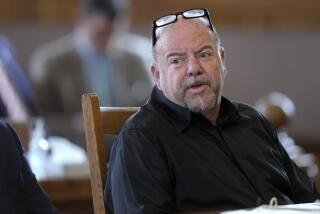Brown’s Phone Bank Survey Wasn’t Illegal, State Probers Decide
- Share via
SACRAMENTO — The state Fair Political Practices Commission announced Monday that it found nothing illegal about a taxpayer-financed telephone bank set up by Assembly Speaker Willie Brown’s top aide to conduct surveys for four Democrats “targeted” for defeat by Republicans.
The watchdog commission said the boiler room operation two blocks from the Capitol is within the law because “the scripts did not expressly advocate the nomination, election or defeat of any candidate.”
Brown’s chief of staff, Richard Ross, set up the telephone operation in July to call constituents in the districts of the four Democrats, including San Diego’s Lucy Killea, who were expected at the time to face tough reelection challenges this year.
Ross has defended the surveys, covering issues championed by each of the lawmakers, as experiments to see if telephones are more effective than newsletters in garnering support from constituents on legislative issues.
Roger Brown, the FPPC’s enforcement division chief, said the determination that the phone bank did not violate the reform act was based on an analysis of “the evidence . . . existing law and court precedents.”
Assembly Republican Leader Pat Nolan, clearly disappointed over the commission’s finding, said the surveys “stopped just one scintilla short” of political campaigning.
“If they were not intended to do that, why on earth did they conduct (the surveys) in the districts we targeted?” Nolan wondered.
Ross has conceded that he chose the targeted districts--those where Republicans plan major campaign efforts--intentionally, and acknowledged that his motives may have been at least partly political. But he said Monday that he knew all along that the operation was legal.
“I’ve been playing it close to the foul line for a long time,” Ross said. “But politics is like baseball. Ties go to the runner.”
The surveys were conducted at various times between July and December for Killea, Steve Clute of Riverside, Jean M. Duffy of Citrus Heights and Richard Katz of Sepulveda. All except Duffy are running for reelection.
One script for a Killea survey instructed the operator to begin: “Hi, this is (your first name) and I’m calling for Assemblyman Lucy Killea. We are attempting to identify veterans in the San Diego area in order to notify them about important veterans’ issues. Are you a veteran of the U.S. armed forces?”
Killea said the calls were designed to gather information and garner support for a Veterans Service Office in San Diego County.
Surveys conducted for Duffy dealt with legislation she was carrying to toughen drunk driving laws. One Clute survey dealt with a bill on laundering profits from drug sales and other illegal activities, while another was on the siting of a toxic incineration plant. The Katz survey pertained to a resolution he is pushing to require that the cargo sections of sand and gravel trucks be covered.
The legislators said Monday that the FPPC’s decision did not surprise them.
“It is fully what I expected,” said Killea. “The concern I have is that in situations like this, the disposal of a complaint does not receive the same attention that a highly publicized allegation does.”
Clute said he had welcomed the FPPC inquiry because “anytime there is an expenditure of public funds, there should be a process that scrutinizes that very closely.”
“I am glad it is settled,” he added.
Katz said Republicans who have criticized the operation probably had political motivations of their own. The “key question,” Katz said, is whether “any legislator, Democrat or Republican” could have “made use of the service.”
“I don’t think Nolan has charged that he tried to use the service for Republicans and was denied,” Katz added.
The FPPC’s Brown sent identical letters about his decision to Earl Cantos Jr. of San Diego and Matt Webb of Riverside, Republicans seeking to challenge Killea and Clute respectively. Both had asked for FPPC investigations, after broadcast and published reports about the operation.
Cantos, an attorney, said the letter from Brown was satisfactory as far as he is concerned.
“I thought it was something that should be investigated. As long as the proper authorities looked at it and determined that it did not quite cross the line, then I’m satisfied,” he said.
The boiler room operation cost the state about $37,000 and was based in a leased office building near the Capitol. Fifty-five telephone operators, many of them students, were hired by the Office of Majority Service, a branch of the speaker’s office with duties that include communication and outreach for Democratic members.
More to Read
Get the L.A. Times Politics newsletter
Deeply reported insights into legislation, politics and policy from Sacramento, Washington and beyond. In your inbox twice per week.
You may occasionally receive promotional content from the Los Angeles Times.










